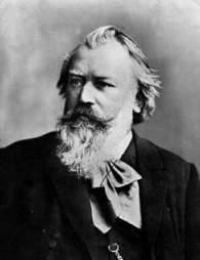Brahms
 Johannes Brahms (May 7, 1833 â April 3, 1897) was a German composer of the Romantic period. He was born in Hamburg and in his later years he settled in Vienna, Austria.
Johannes Brahms (May 7, 1833 â April 3, 1897) was a German composer of the Romantic period. He was born in Hamburg and in his later years he settled in Vienna, Austria.Brahms maintained a Classical sense of form and order in his works â in contrast to the opulence of the music of many of his contemporaries. Thus many admirers (though not necessarily Brahms himself) saw him as the champion of traditional forms and "pure music," as opposed to the New German embrace of program music.
Brahms venerated Beethoven: in the composer's home, a marble bust of Beethoven looked down on the spot where he composed, and some passages in his works are reminiscent of Beethoven's style. The main theme of the finale of Brahms's First Symphony is reminiscent of the main theme of the finale of Beethoven's Ninth, and when this resemblance was pointed out to Brahms he replied that any ass â jeder Esel â could see that.
Ein deutsches Requiem was partially inspired by his mother's death in 1865, but also incorporates material from a Symphony he started in 1854, but abandoned following Schumann's suicide attempt. He once wrote that the Requiem "belonged to Schumann". The first movement of this abandoned Symphony was re-worked as the first movement of the First Piano Concerto.
Brahms also loved the Classical composers Mozart and Haydn. He collected first editions and autographs of their works, and edited performing editions. He also studied the music of pre-classical composers, including Giovanni Gabrieli, Johann Adolph Hasse, Heinrich Schütz and especially Johann Sebastian Bach. His friends included leading musicologists, and with Friedrich Chrysander he edited an edition of the works of François Couperin. He looked to older music for inspiration in the arts of strict counterpoint; the themes of some of his works are modelled on Baroque sources, such as Bach's The Art of Fugue in the fugal finale of Cello Sonata No. 1, or the same composer's Cantata No. 150 in the passacaglia theme of the Fourth Symphony's finale.
 Brahms Latest Sheets Feed
Brahms Latest Sheets Feed Brahms Latest Requests Feed
Brahms Latest Requests Feed
Advertisement
Advertisement
Total 915 sheet(s) found, listing between 260 - 280.
| Song | Added By | Pages | Instruments | Sheet Type | File |
| Brahms Paraphrase Wiegenlied |
ostomat (160)
5086d ago
|
8 | Piano | Original |
|
| Brahms Paraphrase Vergebliches Standchen |
ostomat (160)
5086d ago
|
8 | Piano | Original |
|
| Ballade G minor op. 118 no. 3 |
Vithal (1)
5086d ago
|
5 | Piano | Original |
|
| dance 6 |
torika9san (95)
5086d ago
|
35 | Cello, Drum, Trumpet, Violin, Clarinet, Flute, Viola, Horn, Bass | Original |
|
| hungarian dance no 5 |
kimer13 (8)
5088d ago
|
30 | Drum, Trumpet, Violin, Clarinet, Flute, Saxophone, Viola, Horn, Trombone, Oboe | Transcription |
|
| Wiegenlied |
nathaliemusical (3)
5088d ago
|
2 | Piano, Vocal | Original |
|
| Lullaby |
nathaliemusical (3)
5088d ago
|
1 | Piano, Vocal | Original |
|
| S'il suffisait d'aimer |
hamideh (34)
5088d ago
|
3 | Piano, Vocal | Other |
|
| ave maria |
vincenzino (44)
5089d ago
|
6 | Piano, Vocal, Organ | Original |
|
| 6 Hungarian Dances |
antheo (2)
5089d ago
|
40 | Violin | Transcription |
|
| op 77 |
s.hajsadeghi (2)
5089d ago
|
60 | Violin | Other |
|
| Russian Hymne and 4 hands |
klearing (20)
5090d ago
|
41 | Piano | Original |
|
| All By Myself |
klearing (20)
5090d ago
|
5 | Piano, Vocal | Original |
|
| Hungarian Dance |
Negrolyte (7)
5091d ago
|
2 | Piano | Original |
|
| Geliet (TTBB) |
nana_sop2 (366)
5091d ago
|
4 | Vocal | Transcription |
|
| Hungarian Dance |
azginporsuk (1)
5091d ago
|
3 | Piano | Other |
|
| Sonata no. 1 |
youngrph (2)
5091d ago
|
49 | Piano | Original |
|
| valses op. 39 (four hands) |
esparrago (41)
5091d ago
|
22 | Piano | Book |
|
| Brahms' Lullaby page 06 |
theefiets (20)
5092d ago
|
1 | Piano, Vocal | Original |
|
| Brahms' Lullaby page 05 |
theefiets (20)
5092d ago
|
1 | Piano, Vocal | Original |
|

